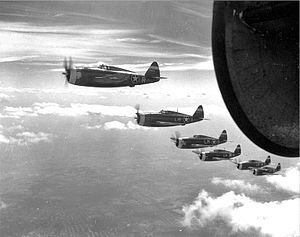| Operation Pointblank | |||||||
|---|---|---|---|---|---|---|---|
| Part of Strategic bombing campaign in Europe | |||||||
 USAAF P-47 Thunderbolt fighters, assigned to protect 8th Air Force bomber formations and to hunt for German fighters. | |||||||
| |||||||
| Belligerents | |||||||
|
|
| ||||||
| Commanders and leaders | |||||||
|
| Unknown | ||||||
The Pointblank directive authorised the initiation of Operation Pointblank, the code name for the part[2] of the Allied Combined Bomber Offensive intended to cripple or destroy the German aircraft fighter strength, thus drawing it away from frontline operations and ensuring it would not be an obstacle to the invasion of Northwest Europe. The Pointblank directive of 14 June 1943 ordered RAF Bomber Command and the U.S. Eighth Air Force to bomb specific targets such as aircraft factories, and the order was confirmed when Allied leaders met at the Quebec Conference in August 1943. Up to that point, the RAF and USAAF had mostly been attacking the German industry in their own way – the British by broad night attacks on industrial areas, and the US in "precision attacks" by day on specific targets. The operational execution of the Directive was left to the commanders of the forces. As such, even after the directive, the British continued their night attacks. The majority of the attacks on German fighter production and combat with the fighters were conducted by the USAAF.[3][4]
In practice, the USAAF bombers made large-scale daylight attacks on factories involved in fighter aircraft production. The Luftwaffe was forced into defending against these raids, and its fighters were drawn into battle with the bombers and their escorts. It was these battles of attrition that reduced the Luftwaffe's fighter pilot strength, despite increases in German aircraft production.[5]
- ^ Gruen, pp. 4(Round 1), 5(Round 2) 24.
- ^ Emerson (1962), p. 4.
- ^ Varley (2005), p. 32.
- ^ Zaloga (2011), p. 12.
- ^ Zaloga (2011), p. 85.
